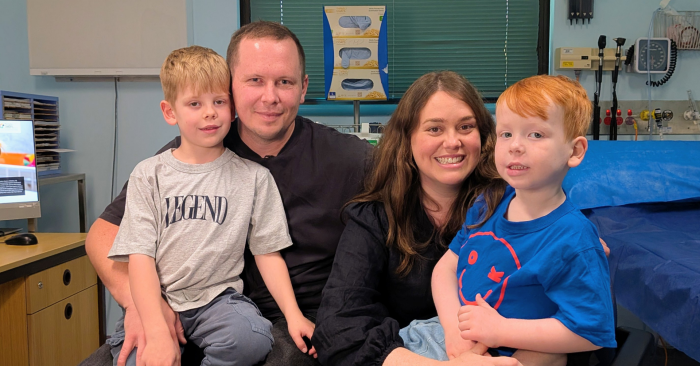A new international study has shown that treating babies with spinal muscular atrophy before symptoms appear can dramatically improve outcomes.
Emily and Mitch still remember the afternoon they learnt their newborn son, Xavier, had screened positive for spinal muscular atrophy (SMA).
“We had Mitch’s family over to see Xavier at home for the first time when I took the phone call. It was from a neurologist at the Sydney Children’s Hospital,” Emily said. “They told us Xavier’s newborn screening was positive for SMA. It left us completely numb and confused.”
SMA is a rare genetic condition that causes progressive muscle weakness due to the degeneration of motor neurons in the spinal cord. In its most severe forms, babies cannot sit up and rarely live beyond their first birthday.
At the time, treatment options were limited. Xavier could begin a lifelong regimen of spinal injections or join a clinical trial testing an oral medication called risdiplam.
“We were honestly torn and didn’t know what to choose for Xavier. The hospital team were so supportive and knowledgeable, and with the help of our family, we decided we wanted Xavier to be on the trial,” Emily said.
A new approach to SMA treatment
Xavier was one of 26 infants enrolled in the international RAINBOWFISH trial, which tested the safety and efficacy of risdiplam in presymptomatic babies diagnosed with SMA. Findings from the first two years of the five-year study have been published in the New England Journal of Medicine.
Professor Michelle Farrar, from UNSW Sydney’s School of Clinical Medicine and the Sydney Children’s Hospital, Randwick, co-led the study, which included infants from Australia, the United States, Belgium, Brazil, Poland, Russia and Taiwan.
“The really exciting thing about this is that it’s an oral drug which can be taken at home and be initiated as soon as the diagnosis is made,” Prof. Farrar said. “It is important to start treatment as soon as possible to preserve strength from the very start. Every day counts when there is irreversible loss of motor neurons.”
Risdiplam helps the body produce more of an essential protein that is deficient in SMA, known as Survival Motor Neuron (SMN) protein. The drug works by switching on a backup gene (SMN2) so it can produce enough of the functional protein.

